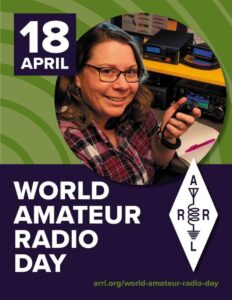 What: 2022 World Amateur Radio Day
What: 2022 World Amateur Radio Day
Who: All amateur radio operators worldwide
When: Monday, April 18, 2022 at 0000 UTC until Tuesday, April 19, 2022 at 0000 UTC
Where: A global event covering all regions of the International Amateur Radio Union (IARU)
Why: World Amateur Radio Day, held on April 18 each year, is celebrated worldwide by radio amateurs and their national associations which are organized as member-societies of the International Amateur Radio Union (IARU). It was on this day in 1925 that the IARU was formed in Paris. American Radio Relay League (ARRL) Co-Founder Hiram Percy Maxim was its first president.
Amateur radio experimenters were the first to discover that the short-wave spectrum?could support long-distance radio signal propagation. In the rush to use these shorter wavelengths, amateur radio was “in grave danger of being pushed aside,” the IARU’s history has noted. Amateur Radio pioneers met in Paris in 1925 and created the IARU to promote the interests of amateur radio worldwide and to protect and enhance its spectrum privileges. Today, the IARU is a federation consisting of more than 160 national amateur radio organizations in as many countries and separate territories. The International Secretariat of the IARU is ARRL, the national association for amateur radio® in the United States.
On World Amateur Radio Day, all radio amateurs are invited to take to the airwaves to enjoy our global friendship with other amateurs, and to show our skills and capabilities to the public.
How: World Amateur Radio Day is not a contest but rather an opportunity to “talk” about the value of amateur radio to the public and our fellow amateur colleagues. It is also a great opportunity to talk about your radio club and amateur radio in local media as a lead-up to ARRL Field Day (held each year during the fourth full weekend in June) and another ham radio related activity in your community – such as volunteers who serve in local emergency communication readiness including the ARRL Amateur Radio Emergency Service®.
Here are just a few ways to participate in, and promote, World Amateur Radio Day:
- Get a station on the air! Create your own personal “event” to talk about amateur radio to others, including family and friends.
- Find out more about World Amateur Radio Day by checking the IARU website and other Resources listed below.
- Create and hold a special net or on-air event on World Amateur Radio Day to raise the level of attention for the celebration, and to encourage other hams to talk about our hobby. Consider creating and offering a commemorative certificate for contacting your special activation. It can be an electronic one as these are cost effective.
- Get the word out! If you are an ARRL Public Information Coordinator, Public Information Officer, or responsible for radio club publicity, send a press release and conduct some public relations outreach to highlight the day and/or events. Talk about all of the activities radio amateurs have continued to support during the pandemic, and how amateur radio serves our communities. Find recent examples of amateur radio in-the-news at www.arrl.org/media-hits.
- Promote your personal World Amateur Radio Day activity(ies) on social media platforms like Twitter and Facebook by using the hashtag #WorldAmateurRadioDay. Make sure you send it to various clubs, reflectors, and media.
Join us in celebrating World Amateur Radio Day and all the ways amateur radio brings us together!
Resources
ARRL, the national association for Amateur Radio
http://www.arrl.org/world-amateur-radio-day (this page)
IARU
https://www.iaru.org/on-the-air/world-amateur-radio-day
IARU Region 2: The Americas
https://www.iaru-r2.org/en/on-the-air/world-amateur-radio-day/
Article: “Why World Amateur Radio Day is key to highlight crucial service,” ITU News Magazine (No. 1, 2021)
https://www.itu.int/en/myitu/Publications/2021/02/02/15/24/ITU-News-Magazine-No-1-2021
Public Relations and Outreach
2022 World Amateur Radio Day backgrounder (PDF)
2022 World Amateur Radio Day media advisory (WORD template)
Poster or flyer
World Amateur Radio Day poster (8-1/2 x 11 JPG)
Día Mundial de la Radioafición poster (8-1/2 x 11 JPG)
Special thanks to ARRL member Anne Frank, KD9LRB of Deer Park, Wisconsin, featured in these posters!
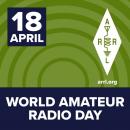 Social media and website graphics (JPG)
Social media and website graphics (JPG)
440 x 220 English Spanish
468 x 200 English Spanish
608 x 259 English Spanish
700 x 225 English Spanish
1080 x 1080 English Spanish
1200 x 628 English Spanish
5599 x 1566 banner English Spanish
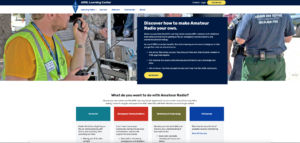 Are you in need of a club presentation at your next meeting? Be sure to check out the ARRL’s Webinar series recordings at <https://learn.arrl.org/webinars/?pathPage=%2Farrl%2Fcourses>.
Are you in need of a club presentation at your next meeting? Be sure to check out the ARRL’s Webinar series recordings at <https://learn.arrl.org/webinars/?pathPage=%2Farrl%2Fcourses>. 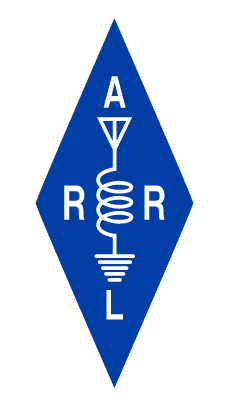

 The March, 2022 Rhode Island Activity Report is now available at <
The March, 2022 Rhode Island Activity Report is now available at <

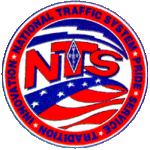 On Saturday, March 19 at 10:00 AM NTS leaders will meet with Assistant Director Cory Golob, KU1U, to discuss: NTS today, what is working, what is not, a look into the future, what would we like to see and what can we expect from ARRL.
On Saturday, March 19 at 10:00 AM NTS leaders will meet with Assistant Director Cory Golob, KU1U, to discuss: NTS today, what is working, what is not, a look into the future, what would we like to see and what can we expect from ARRL.